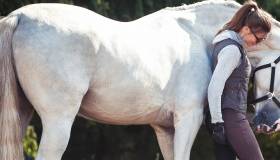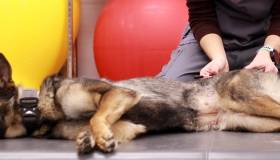
DENVER/February 26, 2020 – To reduce the risk of antibiotic-resistant bacteria, Morris Animal Foundation-funded researchers at the University of California, Davis, and the Koret School of Veterinary Medicine are evaluating a new therapy to treat dogs with clinical urinary tract infections (UTI). The team is conducting a multicenter clinical trial comparing a biotherapeutic treatment with conventional antimicrobial therapy. If successful, the new therapy may help decrease overall use of antimicrobials to treat UTI in dogs.
Roughly 14% of dogs will develop a UTI in their lifetime, usually caused by a pathogenetic strain of E. coli or other bacteria entering their urethras and colonizing the urinary bladder. Typical symptoms will include an urgency to urinate, blood in urine and possible pain during urination. Antimicrobials often are prescribed for treatment of UTI in dogs.
“Antibiotic resistance is all over the news and is a very important health concern in both animals and humans,” said Dr. Jodi Westropp, a professor at the UC Davis School of Veterinary Medicine and principal investigator on the study. “I want to avoid that, but also, as a veterinarian, be able to treat and care for my patients in the most effective way possible.”
The new therapy Dr. Westropp’s team is studying uses a biotherapeutic – a strain of asymptomatic bacteria that does not cause disease – called E. coli ASB 212. The ASB 212 is mixed with a small amount of saline and instilled into the bladder using a urinary catheter. The minimally invasive procedure, performed under sedation if needed, takes approximately 10-15 minutes to instill.
For the randomized study, the team is recruiting at least 50 dogs with active UTI that have had a minimum of one UTI in the previous 12 months. The dogs will be randomized to one of two treatment groups: 1) the ASB 212 which can be administered up to two times or 2) conventional antimicrobial therapy for seven days.
In the initial pilot study, the team tested the ASB 212 on nine dogs that had at least three UTIs in the previous year. Four of the nine client-owned dogs had complete or nearly complete clinical cures by day 14. Of these four dogs, three also had microbiologic cures (sterile urine cultures) at day 14; one of these dogs had subclinical bacteriuria (in addition to ASB E. coli 212). Three of these four dogs had ASB E. coli 2-12 isolated from their urine at day 14. While this was a short-term study, follow-up was available on two dogs in which E. coli ASB 212 was isolated 60 days after bacterial instillation, and the dogs remained free of lower urinary tract signs for more than six months.
Antibiotic resistance occurs when bacteria evolve to evade the effects of antibiotics, which can happen at a rapid pace. Furthermore, antimicrobials also can cause side effects, such as intestinal problems, adding to the out-of-pocket treatment cost for pet owners.
“This biotherapeutic could provide a safe alternative for dogs at large and, for some dogs, the only option to deal with the discomfort of UTIs,” said Dr. Janet Patterson-Kane, Morris Animal Foundation Chief Scientific Officer. “We hope this treatment will be at least as good as the current standard of care so owners can consider it in lieu of antimicrobials.”
Morris Animal Foundation, headquartered in Denver, is one of the largest nonprofit animal health research organizations in the world, funding more than $155 million in studies across a broad range of species.
About Morris Animal Foundation
Morris Animal Foundation’s mission is to bridge science and resources to advance the health of animals. Founded by a veterinarian in 1948, we fund and conduct critical health studies for the benefit of all animals. Learn more at morrisanimalfoundation.org.




